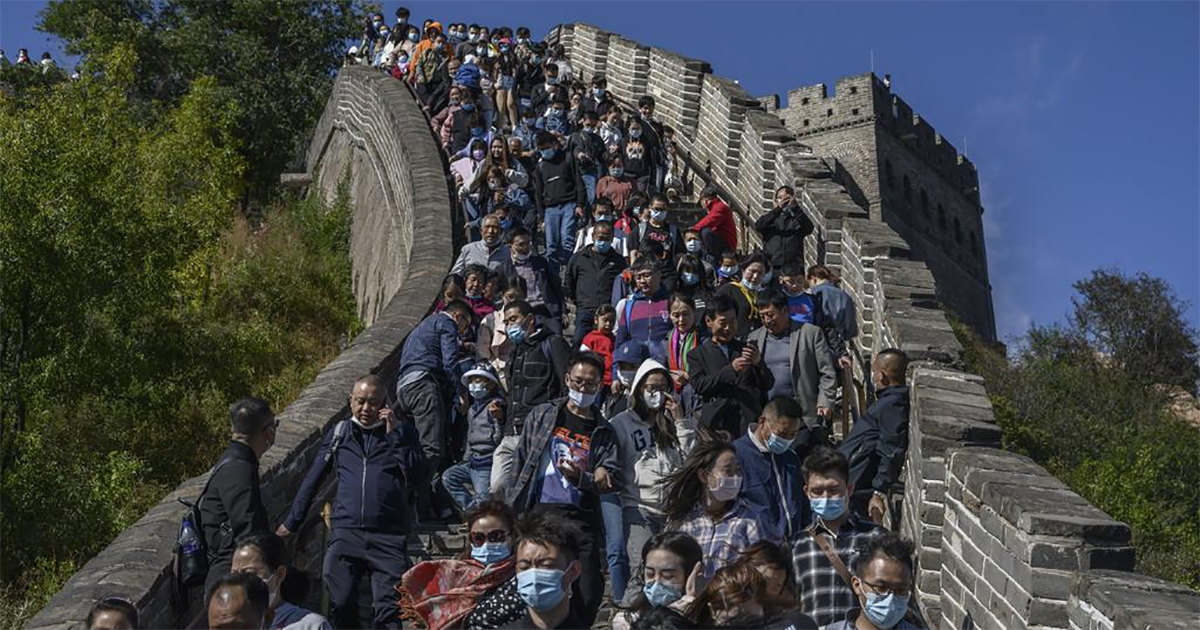Some 425 million people in China are taking a vacation as the world continues convulsing as a result of the Covid-19 pandemic.
Barely nine months of border closures and restricted movement later, the coronavirus has largely been brought under control in China, Bloomberg reported.
In response to stamping out Covid-19, the Golden Week holiday is seeing massive numbers of people going about their lives en masse once again, as the event of Covid-19's detection in Wuhan has become a distant memory.
This mass movement of people has been seen from the outside as a display of China's confidence in its economic recovery and its public health measures.
Almost pre-Covid-19 number of travellers
Through the first four days of the week-long holiday that started Oct. 1, some 425 million people have travelled domestically, according to the Ministry of Culture and Tourism.
This figure represents nearly 80 per cent of last year’s numbers pre-Covid-19.
These hundreds of millions going about their lives is in stark contrast to the rest of the world.
The global tourism industry is expected to lose at least US$1.2 trillion in 2020.
As of September 2020, the OECD forecast a 1.8 per cent expansion this year, putting China alone among the Group of 20 on pace to expand on the strength of its domestic economy.
China showing the rest of the world it can be done
That positive outlook assumes China can avoid another wave of Covid-19 and the aggressive lockdowns used to contain it.
No virus tests or quarantines are needed as hundreds of millions of people crisscross the country during the holiday to mark the founding of the People’s Republic of China in 1949.
Late September 2020, China opened its borders to foreign nationals holding valid residence permits.
There are risks but it appears China is bearing them on behalf of the rest of the world for now in a simulation that others can learn from or avoid.
More than 6 weeks without local infection
China hasn’t reported any local virus infections since Aug. 15.
It only found two asymptomatic cases in late September.
The government has since eased almost all of its peak-Covid travel restrictions.
The ban on group tours was lifted in the middle of July, while every district in every city has been designated "low-risk".
Cross-province travel can happen without any virus tests.
“We have gone at least six weeks without reporting a single confirmed case domestically, which means the environment accessible by ordinary people is virus free,” said Wu Zunyou, chief epidemiologist at the Chinese Center of Disease Control and Prevention, at a briefing in Beijing.
“The chance of you running into an asymptomatic person is very very low, almost negligible.”
Signs of recovery
Flight bookings for the holiday were up 11 per cent compared with 2019, according to a report from travel data and analytics agency Cirium.
Some 11.7 million passengers travelled by train on Oct. 3, down just 15 per cent from 2019.
Reservations for domestic hotels began rising near the end of August.
Prices have soared.
As of Sep. 10, the average hotel booking cost around 20 per cent more this year compared with last year.
Ride-hailing apps Didi and Dida crashed as the holiday period began on Sept. 30, Xinhua reported.
Tickets at the Badaling section of the Great Wall sold out by mid-morning on Oct. 3, the first time daily tickets have sold out since late March.
Hotel spending in Tibet more than doubled from a year earlier, and food-and-beverage spending jumped 49 per cent.
Tibet, Xinjiang and Ningxia were among regions where spending rose fastest on Oct. 1 and 2, Xinhua reported.
We deliver more stories to you on LinkedIn
Top photo via Getty/ Kevin Frayer
If you like what you read, follow us on Facebook, Instagram, Twitter and Telegram to get the latest updates.
